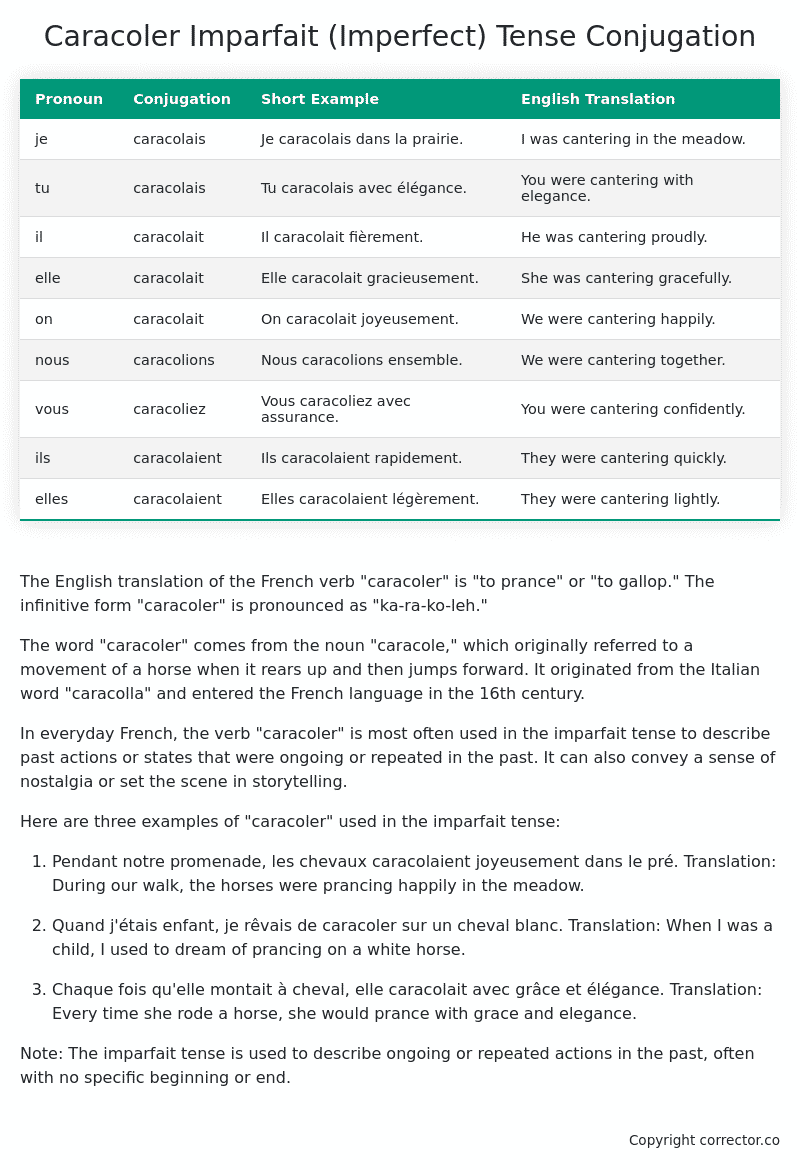Imparfait (Imperfect) Tense Conjugation of the French Verb caracoler
Introduction to the verb caracoler
The English translation of the French verb “caracoler” is “to prance” or “to gallop.” The infinitive form “caracoler” is pronounced as “ka-ra-ko-leh.”
The word “caracoler” comes from the noun “caracole,” which originally referred to a movement of a horse when it rears up and then jumps forward. It originated from the Italian word “caracolla” and entered the French language in the 16th century.
In everyday French, the verb “caracoler” is most often used in the imparfait tense to describe past actions or states that were ongoing or repeated in the past. It can also convey a sense of nostalgia or set the scene in storytelling.
Here are three examples of “caracoler” used in the imparfait tense:
-
Pendant notre promenade, les chevaux caracolaient joyeusement dans le pré.
Translation: During our walk, the horses were prancing happily in the meadow. -
Quand j’étais enfant, je rêvais de caracoler sur un cheval blanc.
Translation: When I was a child, I used to dream of prancing on a white horse. -
Chaque fois qu’elle montait à cheval, elle caracolait avec grâce et élégance.
Translation: Every time she rode a horse, she would prance with grace and elegance.
Note: The imparfait tense is used to describe ongoing or repeated actions in the past, often with no specific beginning or end.
Table of the Imparfait (Imperfect) Tense Conjugation of caracoler
| Pronoun | Conjugation | Short Example | English Translation |
|---|---|---|---|
| je | caracolais | Je caracolais dans la prairie. | I was cantering in the meadow. |
| tu | caracolais | Tu caracolais avec élégance. | You were cantering with elegance. |
| il | caracolait | Il caracolait fièrement. | He was cantering proudly. |
| elle | caracolait | Elle caracolait gracieusement. | She was cantering gracefully. |
| on | caracolait | On caracolait joyeusement. | We were cantering happily. |
| nous | caracolions | Nous caracolions ensemble. | We were cantering together. |
| vous | caracoliez | Vous caracoliez avec assurance. | You were cantering confidently. |
| ils | caracolaient | Ils caracolaient rapidement. | They were cantering quickly. |
| elles | caracolaient | Elles caracolaient légèrement. | They were cantering lightly. |
Other Conjugations for Caracoler.
Le Present (Present Tense) Conjugation of the French Verb caracoler
Imparfait (Imperfect) Tense Conjugation of the French Verb caracoler (You’re reading it right now!)
Passé Simple (Simple Past) Tense Conjugation of the French Verb caracoler
Passé Composé (Present Perfect) Tense Conjugation of the French Verb caracoler
Futur Simple (Simple Future) Tense Conjugation of the French Verb caracoler
Futur Proche (Near Future) Tense Conjugation of the French Verb caracoler
Plus-que-parfait (Pluperfect) Tense Conjugation of the French Verb caracoler
Passé Antérieur (Past Anterior) Tense Conjugation of the French Verb caracoler
Futur Antérieur (Future Anterior) Tense Conjugation of the French Verb caracoler
Subjonctif Présent (Subjunctive Present) Tense Conjugation of the French Verb caracoler
Subjonctif Passé (Subjunctive Past) Tense Conjugation of the French Verb caracoler
Subjonctif Imparfait (Subjunctive Imperfect) Tense Conjugation of the French Verb caracoler
Subjonctif Plus-que-parfait (Subjunctive Pluperfect) Tense Conjugation of the French Verb caracoler
Conditionnel Présent (Conditional Present) Tense Conjugation of the French Verb caracoler
Conditionnel Passé (Conditional Past) Tense Conjugation of the French Verb caracoler
Conditionnel Passé II (Conditional Past II) Tense Conjugation of the French Verb caracoler
L’impératif Présent (Imperative Present) Tense Conjugation of the French Verb caracoler
L’impératif Passé (Imperative Past) Tense Conjugation of the French Verb caracoler
L’infinitif Présent (Infinitive Present) Tense Conjugation of the French Verb caracoler
L’infinitif Passé (Infinitive Past) Tense Conjugation of the French Verb caracoler
Le Participe Présent (Present Participle) Tense Conjugation of the French Verb caracoler
Le Participe Passé (Past Participle) Tense Conjugation of the French Verb caracoler
Struggling with French verbs or the language in general? Why not use our free French Grammar Checker – no registration required!
Get a FREE Download Study Sheet of this Conjugation 🔥
Simply right click the image below, click “save image” and get your free reference for the caracoler imparfait tense conjugation!

Caracoler – About the French Imparfait Tense
NOTE: To take a deep dive into all the French tenses then see our article on Mastering French Tense Conjugation.
Formation of the Imparfait Tense
For regular -er verbs:
For regular -ir verbs
For regular -re verbs
Common Everyday Usage Patterns
Description of Past Habits
Background Information
Mental and Emotional States
It’s employed to express emotions, thoughts, or physical sensations in the past. For example: “J’étais content quand il est arrivé.” (I was happy when he arrived.)
Ongoing Actions
Points to Note About the Imparfait Tense
Passé Composé vs. Imparfait
Conditional
Si Clauses
Narration
I hope you enjoyed this article on the verb caracoler. Still in a learning mood? Check out another TOTALLY random French verb imparfait conjugation!


